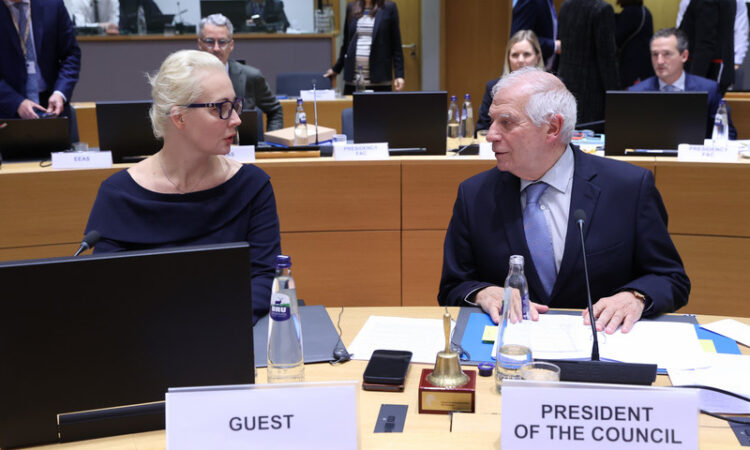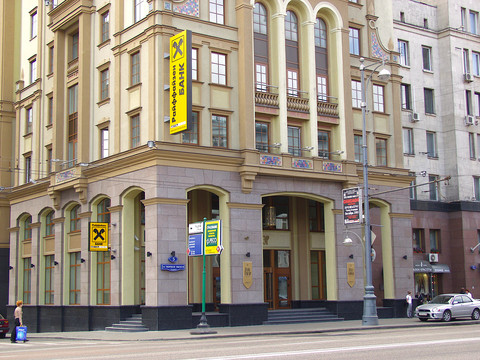
EU banks still operating in Russia are squirming to show they’re abandoning their ever-more toxic client — but actions speak louder than words.
Austria’s top lender, Raiffeisen Bank International (RBI), which made €1.8bn in pre-tax profit in Russia last year, told EUobserver on Monday (19 February) its “plan is not affected by the recent developments”.
The “developments” were the death in jail of Russia’s best-known anti-corruption activist Alexei Navalny on Friday in what EU foreign ministers meeting in Brussels, also on Monday, blamed on Russian president Vladimir Putin’s regime.
EU human-rights sanctions should now be called “Navalny human-rights sanctions”, EU foreign-relations chief Josep Borrell declared, after inviting Navalny’s widow, Yulia, to speak at the EU Council.
Navalny’s killing was a “watershed moment” in Russian history, said Irish foreign minister Micheál Martin.
Meanwhile, RBI’s “plan” was to one day quit Russia via a “sale or spin-off”, its spokesman told EUobserver.
“Since the completion depends at many stages on third parties’ actions and factors outside of RBI´s control, [RBI] does not disclose a timetable,” he added.
RBI has also shared a more detailed plan with Ukrainian authorities, the Austrian government, and the European Commission.
It was about 11 pages long and marked “confidential”.
It was designed to get the bank off Ukraine’s “sponsors of war” blacklist.
And the EU Commission got involved after Austria earlier threatened to veto EU sanctions on Russia unless Ukraine complied.
But according to a letter from Ukrainian authorities to RBI sent earlier in February and seen by EUobserver, even RBI’s secret plan was full of “mist … blind spots … unanswered questions”.
“The sale timeline is missing and because of that we are prevented from making judgement on its feasibility,” Ukraine said.
RBI has been saying it is leaving Russia since shortly after Putin’s invasion of Ukraine two years ago.
Its Russian profits come from retail services, as RBI is one of the last banks that wealthy Russians can use to transfer money in and out of the EU.
It also took part in Putin’s “payment holidays for conscripts” scheme in Q4 of last year, which gave loan perks to Russian soldiers.
But the RBI spokesman told EUobserver its hands were tied, because “according to the Federal Law of the Russian Federation No. 377-FZ … as a legal entity registered in Russian Federation, RBRU [its Russian branch] is required to adhere to Russian laws”.
RBI “has never” given Russian soldiers any perks of its own accord, he added.
“Of course, RBI does not provide any banking services for clients in Russia-occupied regions of Ukraine,” he also said — in what must have excluded its Russian-soldier clients currently fighting there.
Dutch lender ING, Germany’s Commerzbank and Deutsche Bank, Hungarian bank OTP, Italy’s Intesa SanPaolo and Unicredit, and Swedish bank SEB are also still doing business in Russia.
They have all been talking about leaving for over a year.
When asked by EUobserver on Monday if Navalny’s death would accelerate that process, none of them wanted to comment on the case directly.
An ING spokesman wrote, though: “As we’ve said before, we see no future for ourselves in Russia”.
But its Russian clients still had €1.3bn of unpaid debt with ING, he added, so “walking away basically means giving a gift to the client, which in this case would be especially sensitive”.
An Unicredit spokeswoman said the bank had reduced its exposure to Russia by “about 90 percent” since the Ukraine war began.
Commerzbank said it was busy reducing Russia activities “to the minimum” even before Navalny’s death.
“We [have] therefore recommended that our clients establish a client relationship with alternative banking partners in Russia”, it said.
An SEB spokesman told EUobserver: “We have minimal operations remaining in the country … the process to wind down the remaining operations is ongoing”.
The EU banks are among dozens of other top EU and US firms also still doing business in Russia, in a roll-call of famous corporate and retail names such as: Armani, Benetton, Bosch, Clarins, Eni, Guess, Heineken, PepsiCo, TGI Friday’s, and Total.
Asset wars
They are operating in ever-riskier times, amid talk of tit-for-tat EU-Russia asset seizures.
Navalny’s death has spurred EU talks on use of €320bn of frozen Russian assets to help rebuild Ukraine, with Estonian foreign minister Margus Tasakhna, for instance, saying in Brussels on Monday the EU should go ahead before Putin’s election on 15 March.
Canada, Japan, the UK, and US are also in talks with the EU on seizing Russian assets.
“They should all enact legislation on this at the same time and call it ‘the Navalny Act’ — that would hit Putin between the eyes,” said Bill Browder, a UK financier and human-rights campaigner.
The EU and US talks revolve around fears that if the West seized Putin’s money, other foreign wealth would flee Western jurisdictions.
But that’s not how the financial world worked, Browder said.
“If all the world’s major reserve-currency holders acted together, there’ll be nowhere to flee to. No Saudi billionaire will feel safer keeping his money in India or China because of this,” he said.
EU diplomats are also in talks on a 13th round of Russia sanctions, including on Chinese, Indian, and other foreign firms helping Russia.
The EU has already blacklisted hundreds of Russian companies for “supporting, financing or implementing actions which undermine the territorial integrity, sovereignty, and independence of Ukraine”.
And the fact EU firms were also “supporting, financing” Putin at the same time was “a big problem for our credibility”, one EU diplomat said.
Do the maths
Western companies paid $3.5bn in taxes in Russia in 2022 according to research by independent Russian newspaper Novaya Gazeta.
The cost of a standard 155mm artillery shell is some $3,000.
“EU member states would never agree to sanction their own firms — but the Americans might do it [sanction EU banks in Russia] in future,” the EU diplomat said.
“The best way would be a friendly US-EU deal to hit each other’s companies [still in Russia] at the same time,” he added.
But a second EU diplomat bore out his initial caveat.
And when asked if Austria was expected to keep on pushing to get RBI off Ukraine’s sponsors-of-war list no matter what, the second EU source said: “Probably, yes”.






